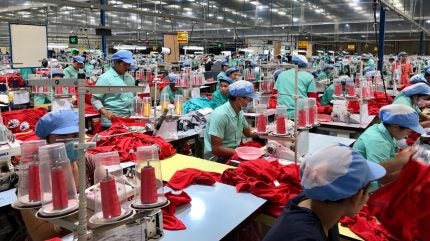
This decision follows a consensus between worker and employer representatives, who have resolved that they are unable to recommend a precise wage figure, according to local Cambodia newspaper The Phnom Penh Post.
A statement issued on 10 September by the country’s Ministry of Labour and Vocational Training indicated that the National Minimum Wage Council had concluded its last meeting on that day.

Discover B2B Marketing That Performs
Combine business intelligence and editorial excellence to reach engaged professionals across 36 leading media platforms.
The statement, as quoted by the publication, reads: “Based on the potential impacts of the imposition of US reciprocal tariffs and the current labour market conditions, the representatives of both workers and employers have unanimously agreed not to propose any specific wage figure.
“They will leave it to the government to make a decision, based on Cambodia’s competitiveness and the country’s social and economic conditions.”
The representatives will submit three recommendations for the prime minister’s consideration, as per the statement.
A total of 21 meetings were held to discuss the minimum wage. These included three tripartite meetings involving workers, employers, and government representatives, as well as three bilateral meetings between workers and employers.

US Tariffs are shifting - will you react or anticipate?
Don’t let policy changes catch you off guard. Stay proactive with real-time data and expert analysis.
By GlobalDataAdditionally, there were seven internal meetings among worker representatives and five internal meetings among employer representatives.
All parties have confirmed that the 10 September meeting represents their final official positions.
The ministry has announced that a concluding tripartite meeting is set for 17 September to undertake the last formalities mandated by minimum wage legislation.
The deferment to government decision is a logical approach amid global economic uncertainties, economist Lor Vichet told The Phnom Penh Post.
The decision requires several considerations such as the international and political climate, export and import rates, labour efficiency, competitive standing in global markets, and notably, Cambodia’s capacity to draw in foreign direct investment, Lor Vichet added.
The current minimum wage stands at $208 per month as of 2025, up from $204 in 2024, with most workers earning additional income through overtime and longevity bonuses.





